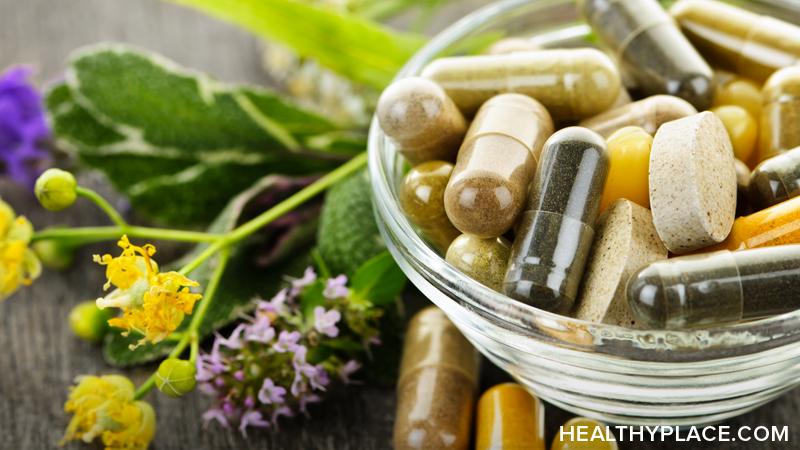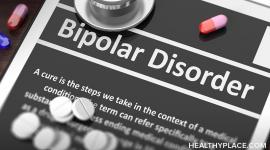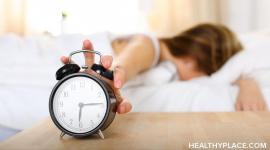Natural Herbs, Supplements for Bipolar Disorder

While most stick with conventional, medical treatment for bipolar disorder, others look for natural herbs and supplements for bipolar disorder. While some supplements have shown promise in bipolar treatment when taken alongside pharmacological treatments, no natural herbs for bipolar disorder have been found. That said, herbs for some bipolar disorder symptoms may also show promise.
Natural Supplements for Bipolar Disorder
There are two supplements that have shown usefulness in treating bipolar disorder – specifically in dealing with bipolar depression.
- Omega-3 fatty acids – The research on this natural supplement for bipolar disorder is “clear” according to Jim Phelps, MD: “This stuff works. Not very powerfully, and it takes a while to get in there.” Omega-3 fatty acids need to be taken in supplement form in order to obtain a therapeutic dosage to help with bipolar depression. Also, you need a highly concentrated version so you can get to 1,000 mg of eicosapentaenoic (EPA) in two or three pills per day and the pills need to contain at least 60% EPA. Note the only studies that support their use add this supplement to traditional treatment; there is no evidence that omega-3 fatty acids are effective when used alone.
- N-acetylcysteine (NAC) – This is, essentially, an amino acid. The research best supports the use of NAC for bipolar depression in addition to traditional treatment and not for use alone. NAC may also work to treat those with obsessive behaviors.
Both of these are available over the counter and there is a pharmaceutical version of an omega-3 fatty acid as well. Note that you should always check with your doctor before starting a natural supplement for bipolar disorder.
Natural Herbs for Bipolar Disorder Symptoms
As stated above, no studied herbs have shown promise in the treatment of bipolar disorder. However, some herbs have been found to treat the symptoms of anxiety and depression. These herbs may be “natural” but they may also interact with bipolar medications or even make some bipolar symptoms worse for some people so it’s critical to check with a doctor before use.
Natural herbs for the bipolar symptom of depression:
- St. John’s wort – This has been studied extensively for mild-to-moderate depression and shows effectiveness like traditional antidepressants. It can take four to six weeks for it to work and it interacts with many medications including birth control pills. St. John’s wort should not be used to treat severe depression (St. John's Wort and the Treatment of Depression).
- Ginkgo – Preliminary research suggests this may treat depression but possibly only in older adults. Ginkgo can increase the risk of bleeding, especially if taking blood thinners.
Note that anything that acts as an antidepressant such as the herbs above, runs the risk of inducing mania, hypomania or rapid cycling for those with bipolar disorder.
Natural herbs for anxiety:
- Valerian – This is often used to treat insomnia but sometimes is used to treat anxiety as well although research on its use is mixed. Valerian may be combined with lemon balm or St. John’s wort to treat mild-to-moderate anxiety. Valerian may interact with other drugs that cause a sedating effect such as benzodiazepines, antihistamines and others.
- Passionflower – A few studies have shown passionflower to have antianxiety effects but more research is needed. As with valerian, this herb can interact with other substances that have a sedating effect.
According to the University of Maryland Medical Center, other herbs that are sometimes recommended for anxiety include ginger, chamomile and licorice. The risks include the following:
“Ginger can increase the risk of bleeding, especially if you also take blood-thinners, such as clopidogrel (Plavix), warfarin (Coumadin), or aspirin. Ginger may also interact with some drugs used to treat high blood pressure. Avoid licorice if you have heart failure, heart disease, kidney or liver disease, or high blood pressure. DO NOT take licorice if you take a diuretic (water pills), anticoagulant (blood thinner), or antidepressant such as Prozac. Chamomile may interact with a number of medications, including blood thinners. People who have or are at risk for hormone-sensitive cancers such as breast, uterine, ovarian, or prostate cancer should avoid taking chamomile. Some people may be allergic to chamomile.”
Additionally, while kava kava has been sometimes suggested for mild-to-moderate anxiety, the Food and Drug Administration has issued a warning concerning dangerous effects on the liver in rare cases.
For more on alternative treatments for bipolar disorder see Can You Manage Bipolar Disorder Without Medication?
APA Reference
Tracy, N.
(2021, December 28). Natural Herbs, Supplements for Bipolar Disorder, HealthyPlace. Retrieved
on 2026, January 21 from https://www.healthyplace.com/self-help/bipolar-disorder/natural-herbs-supplements-for-bipolar-disorder



